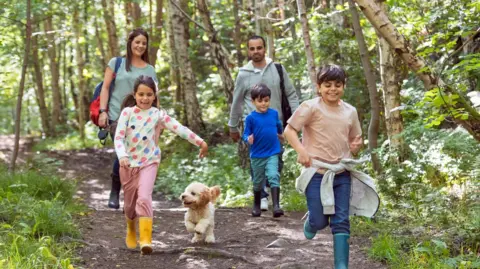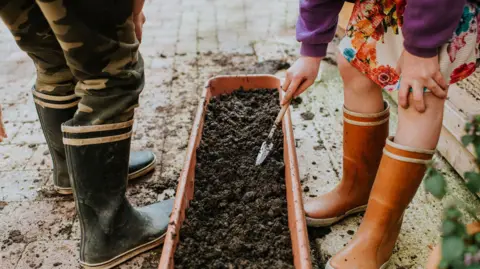 Getty Images
Getty ImagesIf you’ve ever felt calmer after a walk in the park or a stroll through the woods, it’s not your imagination – it’s biology.
Being outdoors can trigger measurable changes inside your body from lowering stress hormones, easing blood pressure and even improving your gut health.
You don’t have to hike for hours to feel these benefits as maximum impact happens after just 20 minutes, so even a lunchtime walk to the park and a sandwich on a bench a few times a week can benefit your body and mind.
Here are four ways that being among nature can help improve your health.
1. You unconsciously relax
When you see green trees, smell pine and hear gentle rustling leaves or the sound of birdsong, your autonomic nervous system – a network of nerves controlling unconscious processes – responds instantly.
This can happen on a visit to the local park.
“We see changes in the body such as a lowering of blood pressure and heart rate variability so your heart beats slower,” says Baroness Kathy Willis, a biodiversity professor at Oxford University.
A UK study, involving nearly 20,000 people, found that those who spent at least a total of 120 minutes every week in greenery were significantly more likely to report good health and higher psychological well-being.
The evidence for the benefits of spending time in nature is compelling enough that some areas have trialled so called green social prescribing connecting people with nature to improve their phsyical and mental health, with a positive impact on happiness and wellbeing.
2. Your hormones reboot
Your body’s hormonal system also joins in the relaxation act.
Willis says that spending time outdoors lowers levels of cortisol and adrenaline – the hormones that surge when you’re stressed or anxious.
“A study found that people in a hotel room for three days who were breathing in Hinoki (Japanese cypress) oil saw a big drop in the adrenaline hormone and a big increase in natural killer cells.”
Natural killer cells are cells that tackle viruses in the body. The participants in the study still had elevated natural killer cells in their body two weeks after inhaling the smell.
Essentially nature “calms what needs calming and strengthens what needs strengthening,” is how Prof Ming Kuo from the University of Illinois at Urbana-Champaign, summed it up to the BBC.
“A three-day weekend in nature has a huge impact on our virus fighting apparatus and even a month later it can be 24% above baseline.”
Studies also show smaller but still persistent effects from shorter periods spent in nature, she says.
3. Smell is a powerful sense
Smelling nature is just as powerful as seeing and hearing it.
The scent of trees and soil is full of organic compounds released by plants and “when you breathe them in, some molecules pass into the bloodstream.”
Willis says pine is a good example of this as the smell of a pine forest can make you calmer within just 20 seconds and that effect lasts for about 10 minutes.
You may think that the relaxing effect of nature is all in your mind, but another study found that even very young babies with no memory associated with particular smells, still calmed down when a pine scent was diffused into the room they were in.
4. Gets good bacteria into your gut
 Getty Images
Getty ImagesAs well as soothing your mind, nature can also help boost your microbiome as soil and plants are full of good bacteria.
“They’re the same kinds of good bacteria we pay for in probiotics or drinks,” Willis explains.
Prof Ming Kuo has studied the effect on factors such as infection susceptibility as well as mental health and says breathing in certain ones have the potential to boost your mood; and the antimicrobial chemicals released by plants – called phytoncides – could help fight disease.
Dr Chris van Tulleken says as an infection scientist he sees nature as a positively challenging environment that “tickles your immune system”.
He gets his children to play with dirt in the forest which then enters their system through the nose or mouth.
Bring nature to you
 Getty Images
Getty ImagesOf course, not everyone can head into the woods on a whim but the good news is, you don’t have to.
Even small touches of nature at home can make a difference, according to Willis.
Visually, flowers such as white or yellow roses have been shown to create the greatest calming effect on brain activity.
When it comes to smell, use a diffuser with essential oils like lavender which can help you relax.
And if all else fails, even a photo of a forest can help.
Research shows that looking at pictures of nature on your laptop or simply gazing out at something green can trigger the same calming brainwave changes and reduce stress.
“Every bit seems to help,” says Prof Ming Kuo.


